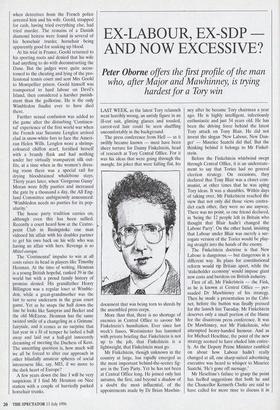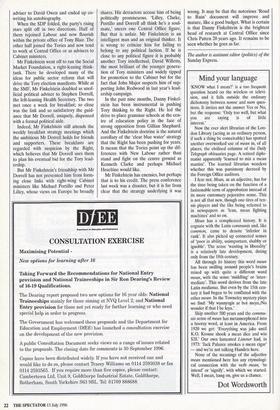EX-LABOUR, EX-SDP AND NOW EXCESSIVE?
Peter Oborne offers the first profile of the man who, after Major and Mawhinney, is trying hardest for a Tory win
LAST WEEK, as the latest Tory relaunch went horribly wrong, an untidy figure in an ill-cut suit, glinting glasses and tousled, carrot-red hair could be seen shuffling uncomfortably in the background.
The press conference from Hell — as it swiftly became known — must have been sheer torture for Danny Finkelstein, head of research at Tory Central Office. For it was his ideas that were going through the mangle, his jokes that were falling flat, his document that was being torn to shreds by the assembled press corps.
More than that, there is no shortage of enemies in Central Office to savour Mr Finkelstein's humiliation. Ever since last week's fiasco, Westminster has hummed with private briefing that Finkelstein is not up to the job, that Finkelstein is a lightweight, that Finkelstein must go.
Mr Finkelstein, though unknown in the country at large, has rapidly emerged as the most important behind-the-scenes fig- ure in the Tory Party. Yet he has not been at Central Office long. He joined only last autumn, the first, and beyond a shadow of a doubt the most influential, of the appointments made by Dr Brian Mawhin- ney after he became Tory chairman a year ago. He is highly intelligent, infectiously enthusiastic and just 34 years old. He has been the driving force behind the latest Tory attack on Tony Blair. He did not invent the slogan 'New Labour, New Dan- ger' — Maurice Saatchi did thaf. But the thinking behind it belongs to Mr Finkel- stein.
Before the Finkelstein whirlwind swept through Central Office, it is an understate- ment to say that Tories had no general election strategy. On occasions, they declared that Tony Blair was a closet com- munist, at other times that he was aping Tory ideas. It was a shambles. Within days of taking over, Mr Finkelstein reached the view that not only did those views contra- dict each other, they were no use anyway. There was no point, as one friend declared, in 'being the 12 people left in Britain who thought that Blair hadn't changed the Labour Party'. On the other hand, insisting that Labour under Blair was merely a sur- rogate version of the Tories would be play- ing straight into the hands of the enemy.
The Finkelstein doctrine is that New Labour is dangerous — but dangerous in a different way. Its plans for constitutional reform would rip Britain apart, while the 'stakeholder economy' would impose giant new costs and burdens on British industry.
First of all, Mr Finkelstein — the Fink, as he is known at Central Office — per- suaded Dr Mawhinney of his strategy. Then he made a presentation to the Cabi- net, before the button was finally pressed for the launch last Tuesday. Mr Finkelstein deserves only a small portion of the blame for the disastrous press conference. It was Dr Mawhinney, not Mr Finkelstein, who attempted heavy-handed humour. And as for Michael Heseltine, the point of the new strategy seemed to have eluded him entire- ly. As the Deputy Prime Minister rambled on about how Labour hadn't really changed at all, one sharp-suited advertising executive was heard to whisper to Maurice Saatchi, 'He's gone off message.'
Mr Heseltine's failure to grasp the point has fuelled suggestions that both he and the Chancellor Kenneth Clarke are said to have called for more time to discuss it in
Cabinet, only to be informed that it should be regarded as a fait accompli. Such sug- gestions are being spread by those who are Mr Finkelstein's enemies, mostly within Central Office. For Mr Finkelstein has fuelled resentment practically ever since he took up his job nine months ago.
Conservative Central Office, set in its comfortable Smith Square headquarters, is set in its ways. The Thatcherite revolution that swept through Britain in the 1980s left party organisation untouched. Mr Finkel- stein made it clear within minutes of enter- ing the building that he did not accept the set way of doing things. He changed the furniture. He brought a cadre of friends and allies with him. Central Office research became tighter, more succinct and user-friendly. MPs much prefer it.
He spends what may be regarded as an indecent amount of time with Cabinet ministers, but he has neglected other rela- tionships. Senior figures at Smith Square complain that he 'is hardly ever here'. His remoteness is said to have upset two important department heads, Alastair Cooke and Julian Lewis. And perhaps there was some resentment that he is any- thing but a traditional Tory.
Snobs have often accused Mrs Thatcher of opening up the Conservative Party to the nouveaux riches, like estate agents and used-car salesmen. She has not perhaps been given all the credit she deserves for welcoming another class of natural Tory supporters. Mr Finkelstein's father was brought up in Siberia after his grandfather, a wealthy Polish capitalist, was exiled there by Stalin. He came to London after the war. His mother was brought up in an Amsterdam suburb, where she knew Ann Frank. She was rescued from Belsen in 1945.
The postwar Tory Party, with its imperi- alist and anti-Semitic resonances, did not try to attract people like these. Danny Finkelstein, under the influence of his par- ents, joined Labour as a young student at the London School of Economics in 1981. He soon switched to the SDP, where he Was swiftly talent-spotted, became political
Vegetarians' insomnia adviser to David Owen and ended up co- writing his autobiography.
When the SDP folded, the party's rising stars split off in two directions. Half of them rejoined Labour and now flourish within the private office of Tony Blair. The other half joined the Tories and now tend to work at Central Office or as advisers to Cabinet ministers.
Mr Finkelstein went off to run the Social Market Foundation, a right-leaning think- tank. There he developed many of the ideas for public sector reform that will drive the Tory election manifesto. While at the SMF, Mr Finkelstein doubled as unof- ficial political adviser to Stephen Dorrell, the left-leaning Health Secretary. The two met once a week for breakfast; so close was the link and so satisfactory the guid- ance that Mr Dorrell, uniquely, dispensed with a formal political aide.
Indeed, Mr Finkelstein still attends the weekly breakfast strategy meetings which the ambitious Mr Dorrell holds for friends and supporters. These breakfasts are regarded with suspicion by the Right, which believes that Mr Dorrell uses them to plan his eventual bid for the Tory lead- ership, But Mr Finkelstein's friendship with Mr Dorrell has not prevented him from form- ing close links with right-wing Cabinet ministers like Michael Portillo and Peter Lilley, whose views on Europe he broadly shares. His detractors accuse him of being politically promiscuous. 'Lilley, Clarke, Portillo and Dorrell all think he's a soul- mate,' sneers one Central Office figure. But that is unfair. Mr Finkelstein is an intelligent man and an original thinker. It is wrong to criticise him for failing to belong to any political faction. If he is close to any political figure it is probably another Tory intellectual, David Willetts, the most brilliant of the younger genera- tion of Tory ministers and widely tipped for promotion to the Cabinet but for the fact that John Major suspects him of sup- porting John Redwood in last year's lead- ership campaign.
In the past nine months, Danny Finkel- stein has been instrumental in pushing Tory thinking to the Right. He led the drive to place grammar schools at the cen- tre of education policy in the face of strong opposition from Gillian Shephard. And the Finkelstein doctrine is the natural corollary of the 'clear blue water' strategy that the Right has been pushing for years. It means that the Tories point up the dif- ferences with New Labour rather than stand and fight on the centre ground as Kenneth Clarke and perhaps Michael Heseltine would like.
Mr Finkelstein has enemies, but perhaps that is to his credit. The press conference last week was a disaster, but it is far from clear that the strategy underlying it was wrong. It may be that the notorious 'Road to Ruin' document will improve and mature, like a good budget. What is certain is that Danny Finkelstein is the brightest head of research at Central Office since Chris Patten 20 years ago. It remains to be seen whether he goes as far.
The author is assistant editor (politics) of the Sunday Express.




































































 Previous page
Previous page